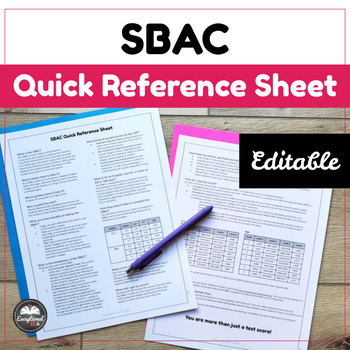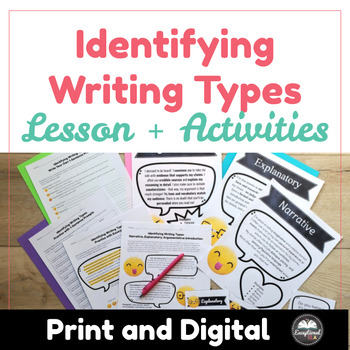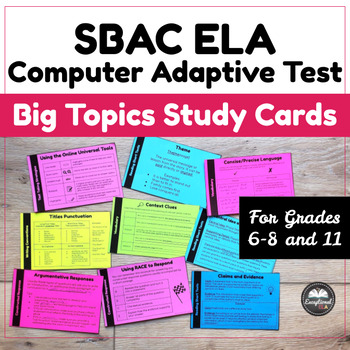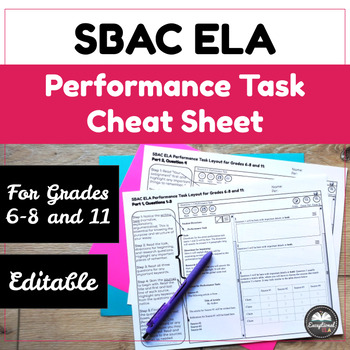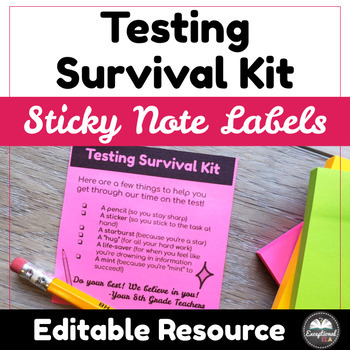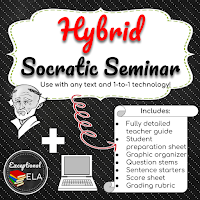
It is the inevitable fact of life that for at least for most teachers in the U.S., state testing becomes a glaring part of our realities in the spring. I'm not a huge fan of having to administer the state test, and I suspect your students aren't either. I understand why the state testing helps keeps schools accountable, but the nature of the test just gives everyone involved such stress and anxiety, especially in the last few weeks and days leading up to it. But I digress! This post is about how I prepare my secondary ELA students for the state testing in the spring, all year long so that we all don't go crazy.
Just some background info before I get into this post: I'm an 8th grade ELA teacher in Southern California, which means my students take the SBAC (Smarter Balanced Assessment Consortium Test). For secondary students, the test is broken up into two pieces: 1) The Performance Task, and 2) The CAT (Computer Adaptive Test). The Performance Task usually involves students analyzing about 4 sources and answering 3 short answer response questions + writing 1 essay, and the CAT test is usually about 40+ mixed types of questions (short response, multiple choice, highlighting answers, etc.). The entire test is taken online, which can sometimes lead to drama that I'll detail later in this post.
Before the school year began
I don't like the idea of "teaching to the test," but I do think it's important to teach the same concepts of the test to my students throughout the year. In the summer, I sat down and looked at practice tests and wrote down all the concepts that came up in the questions many times. I used https://practice.smarterbalanced.org/ many times to see the sample questions for my grade level. I also took some time to look at other grade level questions to see how other grades are being assessed.
In California, the website for administering the SBAC is http://www.caaspp.org/. On the website, teachers can also view and administer the IABs (Interim Assessment Blocks) or ICAs (Interim Comprehensive Assessments). These are benchmark assessments you give your students throughout the school year to prepare them for the state test. I also viewed these tests to see the concepts that came up many times.
In my yearlong planning, I made sure that the units that I taught spiralled in these concepts many times, especially inferences, context clues, main ideas vs. claims, etc. I also made sure that I planned to teach the three main types of writing throughout the school year before the state test: narrative, explanatory, and argumentative.
Throughout the school year
During the school year, I taught the concepts that I narrowed down in the summer and made those some of the important words part of my word wall. I have my students record these words into a study list on Quizlet.com, and at the end of every unit, students are tested on these words.
I also gave an IAB at the end of every unit as well. The nice thing about the IABs is that you get scores really quickly, sometimes with a 1 day turnaround. For some ELA IABs, however, you have to hand-score some answers. So if you have 100+ students, this could take a lot of extra time that you might not have. For me, it was worth it to do a few IABs with hand-scoring items so I could see how my students were writing their constructed response answers. It really helped students to learn the strategy of RACE (Restate, Answer, Cite, Explain.) Having a format for "text-box" questions (that's what I started to call them) helped students really get over the anxiety of "I don't know what to write" syndrome!
Reading and scanning passages, and answering text-dependent questions were skills we also focused on every week. Every week I had my students read a NewsELA article online and take the quiz that comes with it for a few reasons: 1) It helps get them familiar with more informational texts, 2) the news is all current 3) I allow them to choose which articles they want to read, which keeps them more engaged. If they pass the quiz with a 4 out of 4, I also reward them points for the reading program in my classroom (a blog post will come about this later!)
One month before the test
I gave four IABs over the course of the school year:
- Reading Literary Texts
- Reading Informational Texts
- Research
- Edit/Revise (Grammar)
After reviewing my students' scores on these IABs, I collected the names of students who scored below standard. I created "ELA Boot Camps," which were special tutoring sessions after school. Every week in April, I focused on one of the IABs for my ELA Boot Camps. The students who scored below standard only attended the ELA Boot Camp that they scored below standard on. During the boot camp we viewed that particular IAB together and went over the questions as a group. I modeled for my students how I would narrow down the answers. Mostly we went over the strategy of READING THE QUESTION FIRST before reading any passages. I told them that for most of the questions, reading the passage in full isn't really necessary. You can just scan the passage for the key words from the question and be able to answer using prior knowledge and good 'ol common sense!
We started explicitly reviewing for the test at this point. I explained to the students what the SBAC test is and why we are taking it using the SBAC Quick Reference Sheet I created:
The next day, we reviewed the three types of writing using the activity I created Identifying Writing Types. It really helps them to remember what we've written over the past school year and hammer in how those writing prompts might come up on the test.
Next, we practiced with the Brief Writes IAB, which includes short response questions. We did this as a class, instead of me assessing them on this skill individually. Most of questions go like this: "Read this essay from a student and write an introduction or a conclusion to go with it." We practiced with three Brief Writes (one narrative, one explanatory, and one argumentative). We did the narrative one together, I scaffolded and modeled how to complete the explanatory one, and I assigned the argumentative Brief Write as homework. This took about 2 lessons to complete.
Next, we practiced with the online CAT (computer adaptive test) in conjunction with filling out the SBAC Heavy Hitters Study Sheet that I created. This sheet really helped students understand the main concepts of the SBAC test. We did this for about 3 lesssons.
We played trashketball along with the practice CAT too! I had students answer in small groups of 3-4. If their group got the answer correctly, they got a chance to shoot a paper ball into a trashcan and earned points. I created a 1-point line and a 3-point line farther away. Whichever group got the most points got class coupons!
Next, we turned our attention to the Performance Task. I used the Performance Task Cheat Sheet I created to help students understand where to look first when they log on to the test. It's a beast, really, so much information to look at, and it can be hard for students to focus on the important parts if they don't know what they are!
Then, we practiced with an actual performance task. We used the Performance Task IAB together and analyzed the sources in groups to find the main claims, and we talked about how to use RACE for the short answer questions in Part 1. For Part 2, we created outlines for the essay, but didn't write out the whole thing (there would be time enough for that on the real test). We reviewed what basic 5 paragraph essays look like and how to "sandwich" evidence + explanations in between topic and closing sentences. We reviewed what introductory hooks look like and how to write thesis statements. It's not the most exciting material ever, but having some direct experience with this helps gives students confidence for when they're facing it on the SBAC by themselves.
Creating motivation and encouragement
A week before the test, I blasted out an email to all my students' parents about candy donations to create "testing survival kits."
I got the idea from perusing Pinterest, of course! I also had my students write positive encouraging notes on a slip of paper to a random student, and we put those in the testing survival kits along with the candy and stickers. A student and I assembled 100 of these bad boys after school one day. You can get the editable labels here:
When we passed them out on the first day of testing, the students mood shifted from stressed/frustrated to all smiles! Sometimes a little bit of free food goes a long way!
The day before the test
We took a break from test review. I had students color in little donuts and write positive messages on them to add to our "Donut Stress About the Test!" poster. I told the students that getting a good night's rest and taking time to relax would help them prepare for the test. I also said that if they wanted to review last minute items, the Heavy Hitters Study Sheet should be the only thing they look at! I emphasized to them that this test is only one indication of their academic performance, and definitely doesn't represent their worth as a student or as a person!
During testing
I asked my principal ahead of time if we could allow students to eat snacks during testing and he gave the okay. Honestly, allowing students to eat and have snacks during the test has made a big difference in their comfort and stress levels. It's something special they get to do during the test that they don't normally get to do!
Also, every year without fail, there will be tech issues. On the second day of testing this year, we dealt with our students being unable to log in from 9:30am until the end of the school day. It was an exercise in frustration, and all I could do was tell my kids that they had to patient. I told them technology is an amazing tool, but we have to flexible and realize it doesn't always work perfectly all the time. We ended up playing board games for the rest of the day in my periods where the login wasn't working. It worked fine for the rest of the test!
Anticipate some students not taking the test as seriously as other students. Some will finish much faster than others. There is nothing you can really do beyond telling them to try their best. Know that you've done everything you could to encourage them, but in the end, the students make their own decisions about how they perform on the state test, even if they're perfectly capable of scoring proficiently. It is what it is.
On the flip side, have a plan for what to do with students who take much longer than others to complete the test. At our school, we send late finishers to the teachers who have prep periods during that time so I can begin teaching lessons again. For example, if I have a few late finishers in my first period class, I will send them to the teacher who has 1st period as prep time. Of course, this was worked out already with the 1st period prep period teacher. I work at a small charter school so we all know we need to support each other in testing. But in lieu of this, we've also had a separate room set aside for testing and had a teacher sit in every period to get students done with the test. With the SBAC, students should get as much time as they need to complete it.
After testing
It took us about 6 school days for every student to complete the 8th grade ELA test in it's entirety (regular 55 minute class periods - no special block scheduling). I was SO DONE with testing, and students were SO DONE with testing. On the last day, I decide we should throw paper balls at each other. It was the best. Thing. Ever.
That's about it!
The rest of the school year my students and I are taking on our career research projects which will result in a mock career fair! A later blog post and TpT resource will be coming about this soon!
Let me know if you have any questions about administering and/or preparing for the SBAC test with your students and I'll definitely make sure to get back to you as soon as I can!
-Stacey
Follow

